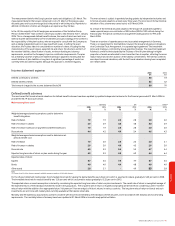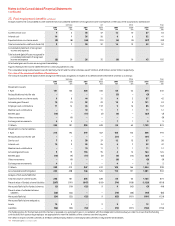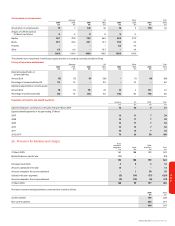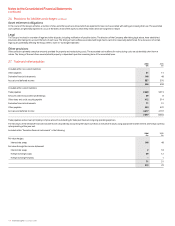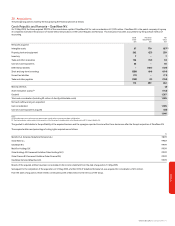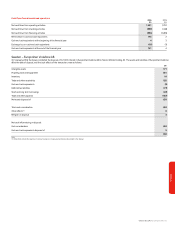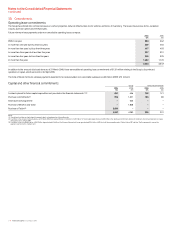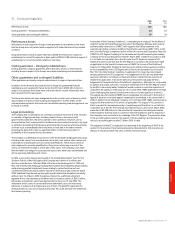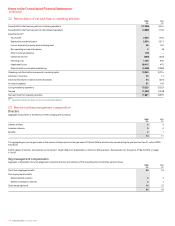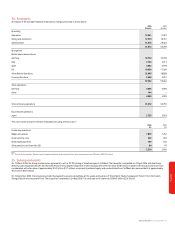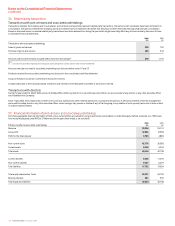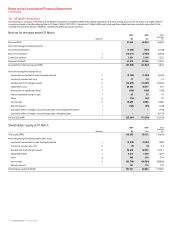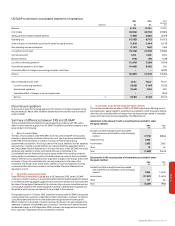Vodafone 2006 Annual Report Download - page 119
Download and view the complete annual report
Please find page 119 of the 2006 Vodafone annual report below. You can navigate through the pages in the report by either clicking on the pages listed below, or by using the keyword search tool below to find specific information within the annual report.
Vodafone Group Plc Annual Report 2006 117
Financials
31. Contingent liabilities 2006 2005
£m £m
Performance bonds 189 382
Credit guarantees – third party indebtedness 64 67
Other guarantees and contingent liabilities 19 18
Performance bonds
Performance bonds require the Group to make payments to third parties in the event
that the Group does not perform what is expected of it under the terms of any related
contracts.
Group performance bonds include £152 million (2005: £149 million) in respect of
undertakings to roll out 3G networks in Spain and £nil (2005: £189 million) in respect of
undertakings to roll out 2G and 3G networks in Germany.
Credit guarantees – third party indebtedness
Credit guarantees comprise guarantees and indemnities of bank or other facilities
including those in respect of the Group’s associated undertakings and investments.
Other guarantees and contingent liabilities
Other guarantees principally comprise commitments to support disposed entities.
In addition to the amounts disclosed above, the Group has guaranteed financial
indebtedness and issued performance bonds for £33 million (2005: £36 million) in
respect of businesses which have been sold and for which counter indemnities have
been received from the purchasers.
The Group also enters into lease arrangements in the normal course of business, which
are principally in respect of land, buildings and equipment. Further details on the
minimum lease payments due under non-cancellable operating lease arrangements can
be found in note 30.
Legal proceedings
The Company and its subsidiaries are currently, and may be from time to time, involved
in a number of legal proceedings, including inquiries from or discussions with
governmental authorities, that are incidental to their operations. However, save as
disclosed below, the Company and its subsidiaries are not involved currently in any legal
or arbitration proceedings (including any governmental proceedings which are pending
or known to be contemplated) which may have, or have had in the twelve months
preceding the date of this report, a significant effect on the financial position or
profitability of the Company and its subsidiaries.
The Company is a defendant in four actions in the United States alleging personal injury,
including brain cancer, from mobile phone use. In each case, various other carriers and
mobile phone manufacturers are also named as defendants. These actions are at an
early stage and no accurate quantification of any losses which may arise out of the
claims can therefore be made as at the date of this report. The Company is not aware
that the health risks alleged in such personal injury claims have been substantiated and
will be vigorously defending such claims.
In 2002, a class action lawsuit was brought in the United States District Court for the
Southern District of New York against the Company and certain of its officers and
directors under Sections 10(b) and 20(a) of the Securities Exchange Act of 1934 and
Rule 10b-5 thereunder alleging principally that Vodafone had improperly delayed taking
and disclosing goodwill impairment losses relating to certain fixed line and non-
controlled mobile assets that Vodafone reported in the financial year ended 31 March
2002. Vodafone firmly denied any wrongdoing and believes the allegations are wholly
without merit. On 4 March 2005, the parties entered into a definitive settlement
agreement for a cash payment by Vodafone and its insurance carriers of $24.5 million,
before fees and expenses, which was approved by the Court on 15 July 2005. The
settlement, which covers all current and former defendants, does not involve any
admission or evidence of wrongdoing by any of them. The plaintiffs’ application for
reimbursement of costs and an award of attorneys’ fees to be paid form the settlement
fund remains pending.
A subsidiary of the Company, Vodafone 2, is responding to an enquiry (“the Vodafone 2
enquiry”) by the UK Inland Revenue (now called “Her Majesty’s Revenue and Customs”
and hereinafter referred to as “HMRC”) with regard to the UK tax treatment of its
Luxembourg holding company, Vodafone Investments Luxembourg SARL (“VIL”), under
the Controlled Foreign Companies section of the UK’s Income and Corporation Taxes Act
1988 (“the CFC Regime”) relating to the tax treatment of profits earned by the holding
company for the accounting period ended 31 March 2001. Vodafone 2’s position is that
it is not liable to corporation tax in the UK under the CFC Regime in respect of VIL.
Vodafone 2 asserts, inter alia, that the CFC Regime is contrary to EU law and has made
an application to the Special Commissioners of HMRC for closure of the Vodafone 2
enquiry. On 3 May 2005, the Special Commissioners referred certain questions relating
to the compatability of the CFC Regime with EU law to the European Court of Justice
(the “ECJ”) for determination. Vodafone 2’s application for closure has been stayed
pending delivery of the ECJ’s judgment. In its judgement, the ECJ will only determine
questions referred to it and does not have jurisdiction to determine the outcome of
Vodafone 2’s application. Instead, the Special Commissioners will apply the ECJ’s
judgement to the particular facts of Vodafone 2’s application. Although it is not possible
to address all possible outcomes, it should be noted that even if the CFC Regime is held
by the ECJ to be entirely lawful, Vodafone 2 would continue to resist the imposition of
corporation tax liability on other grounds. On 15 June 2005, HMRC appealed to the High
Court challenging the Special Commissioners’ decision to refer questions to the ECJ.
This appeal was dismissed and HMRC has since appealed this dismissal to the Court of
Appeal. A decision in the latter appeal is expected to be rendered in the second half of
2006. In addition to the Vodafone 2 enquiry, on 31 October 2005, HMRC commenced an
enquiry into the residence of VIL which is ongoing (the “VIL enquiry”). VIL’s position is
that it is resident for tax purposes solely in Luxembourg and therefore it is not liable for
corporation tax in the UK. The Company has taken provisions, which at 31 March 2006
amounted to £2,098 million, for the potential UK corporation tax liability and related
interest expense that may arise in connection with the Vodafone 2 and VIL enquiries, if
the Company is not successful in its challenge of the CFC Regime. The provisions relate
to the accounting period which is the subject of the proceedings described above as
well as to accounting periods after 31 March 2001 to date.
The judgement of the ECJ is expected to be delivered at the beginning of 2007 at the
earliest. In the absence of any material unexpected developments, the provisions are
likely to be reassessed when the views of the ECJ become known.


